TMW #130 | Introducing TMW 100
Welcome to The Martech Weekly, where every week I review some of the most interesting ideas, research, and latest news. I look to where the industry is going and what you should be paying attention to.
👋 Get TMW every Sunday
TMW is the fastest and easiest way to stay ahead of the Martech industry. Sign up to get the full version delivered every Sunday for this and every TMW, along with an invite to the TMW community. Learn more here.
Introducing TMW 100
When I announced TMW PRO late last year, I wrote my thesis for why in TMW #101 | Going Pro. There, I described that TMW is trying to solve an informational problem. What we see and believe when it comes to assessing the value and place of different marketing technologies is distorted through the lens of the sheer volume that media companies need to publish in order to keep tech advertisers and sponsors happy:
“Because of the sheer volume of content, remixed, pushed, and pulled on social media, there’s a never-ending feed of things for us to consume. The scale of which is overwhelming, to say the least - every second produces more than 6,000 tweets, and LinkedIn generates 358 billion content updates in your feed each year. When it comes to published media, the world’s largest media organizations are pushing out upwards of 500 stories a day. There's just too much to get a hold of. It's a content firehose.”
This is because most of the media operate on an advertising business model, which converts content into attention, and then sells that attention to the highest bidder. This creates a hall of mirrors where everywhere you look, there are fake images and it’s all warped: knowing truly where this industry is going is distorted by sponsored articles, ads, webinars, and countless podcasts.
Unlike most media companies, TMW's goal is to save you time. We’re doing a better job if you spend less time on our content because we want to keep the industry informed and ahead of what matters in Martech as quickly as possible. But as the industry has grown well beyond ten thousand discovered companies, I think there’s an even bigger problem. It’s something that can’t be solved with technology, writing, or building an independent media business. But it’s a problem I think TMW can solve.
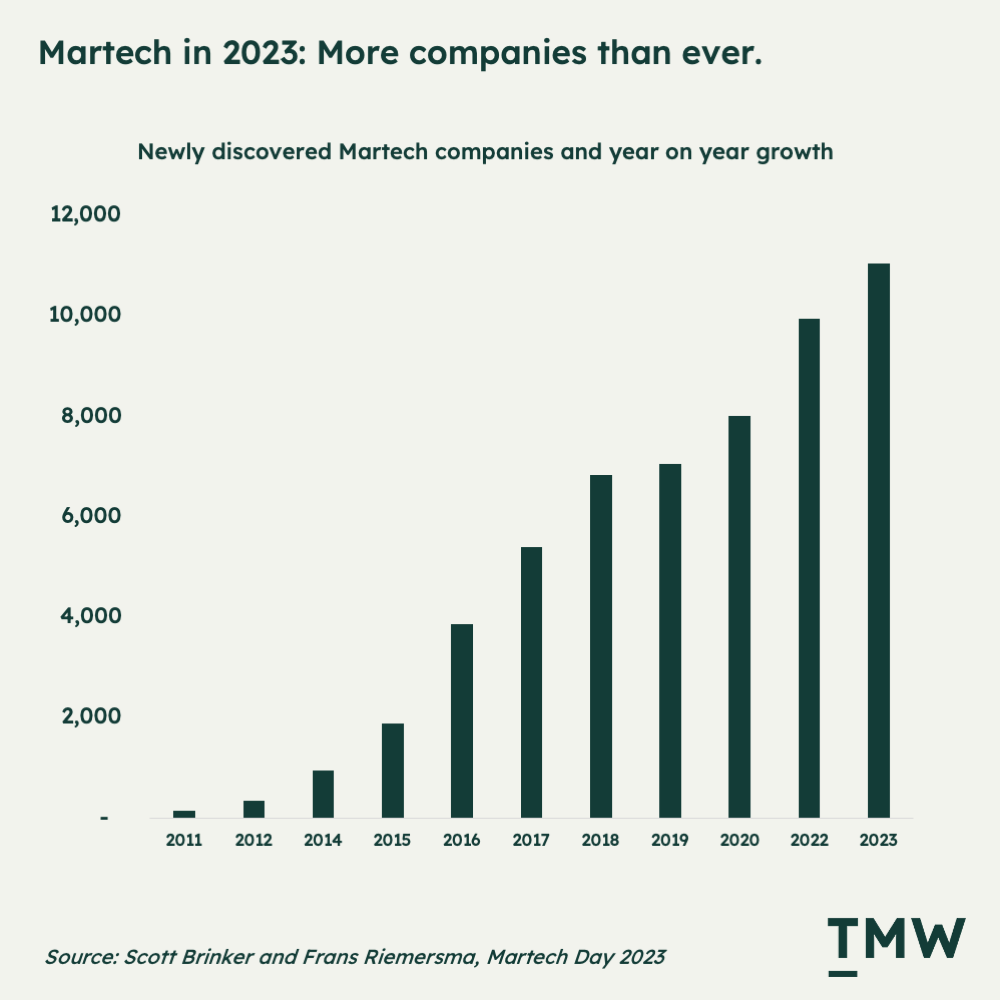
This problem is reputation. The same dynamics we see with attention-based ad businesses apply to how people and companies grow their reputation – it’s too easily bought and manipulated by actors dressed up as innovative, successful, or groundbreaking Martech companies. And this is why I’m announcing something new. It’s called TMW 100. A way to restore trust back into the industry and recognize the true technology leaders in Martech, as voted by you.

TMW 100: A new way to think about innovation
Before we get into the why, let me spend a few sentences explaining what TMW 100 is. TMW 100 is an innovation competition and awards event that will rank the global marketing technology industry from 1st to 100th place. We have 12 judges that represent the global Martech landscape, who decide the shortlist of 100 companies. Once the 100 shortlist is decided, we move on to a people’s choice vote that will rank the global TMW 100 list from 1st to 100th place.
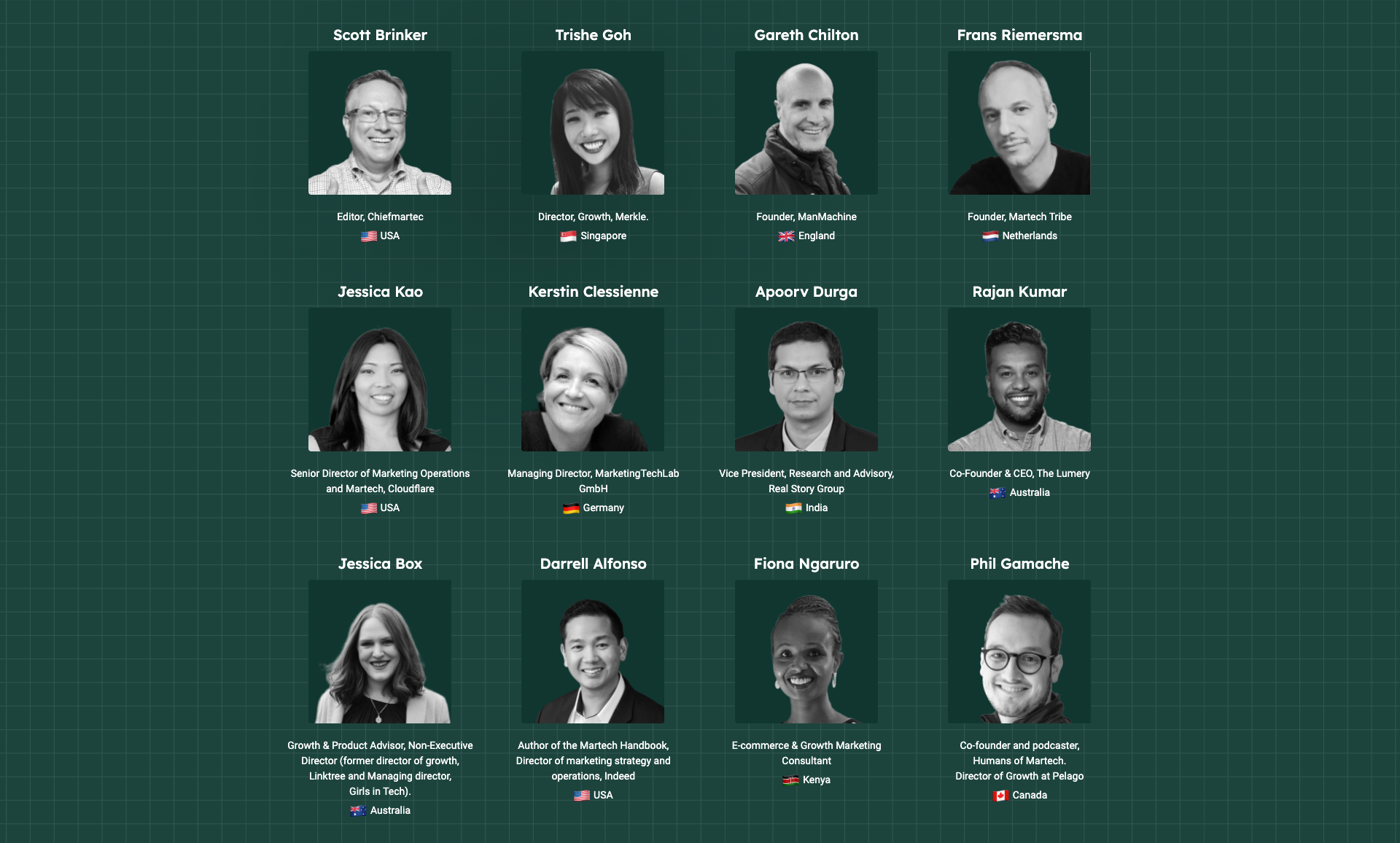
We then fly 1st , 2nd and 3rd place out to MOps-Apalooza, a three-day marketing operations festival in Anaheim California on the 5th of November, to receive their rewards and demo their product in front of 500+ senior marketing technologists. It’s here that we will release the entire rankings of the TMW 100 list.
In December, we are doing our first Martech Innovation Index Report, where 1st place gets their company on the cover (similar to the now-iconic Times Magazine person of the year magazine cover), and where we share insights into how each category in Martech performed, the ranked 100 list in full, and views on the state of innovation in Martech from our panel of judges.
We’re also donating 5% of all proceeds to She Loves Data, a non-profit organization that inspires women around the globe to become active contributors to an increasingly data-driven world. Since 2016, over 16,000 women have attended 200+ free data & tech workshops, certification programs, and webinars, with chapters in 17 countries on 5 continents.
The goal of TMW 100 is to create a single view on which companies are coming up with new ideas, successfully innovating and pushing the boundaries on what Martech can do to create customer and commercial success. Companies can apply with a product, customer-focused or business model case study, and it’s open to any tech company building marketing technology from anywhere in the world. TMW 100 is now open for applications until the 25th of August, and you can download our information pack here.
My hope is that in time, the TMW 100 will become the Pulitzer Prize for marketing technology – a serious marker of excellence for the companies that earn it.
Innovating? Prove it
The question every startup needs to ask is Why. Why invest a significant amount of capital and effort into trying to build a new category of award event for Martech? After all, TMW's product is writing.
For one, the reputation problem is growing on the internet. It’s becoming harder and harder for people to assess the value and quality of products and ideas.
A big part of this is the eventual degradation that happens when advertisers and sponsors get to decide what buyers see when they engage on social media, marketplaces, and content sites. This is playing out in real-time with the enshittification of Amazon and the decline of social networks; the advertisers who pay the bills get far too much of a say in how a platform should operate and create value for the end users. Rachel Cunliffe, from the New Statesman, gives a sobering review of what the internet has become under ad-funded Big Tech platforms:
“I don’t think we need to be quite that hyperbolic to see how technology is destroying something precious: itself. Or rather, the version of itself that felt like a magic spell back in 2006 when you could ask “what should I do tonight?” and it would tell you. I don’t think that’s coming back – the incentives are all skewed, the tech giants are too powerful, the algorithms have a life of their own and there’s no stopping them. The internet now keeps us on it as long as possible not by being helpful or engaging but by simply eliminating all the alternatives. This is it: the pop-ups and the trolls and the sponsored posts have won.”
Even Sergey Brin, the co-founder of Google, predicted that ad-fueled online media would degrade information consumption over time way back in the late 90s. I called this Adtech’s law in TMW #104 | The rise of Retail Media. Here’s what it looks like in the retail world:
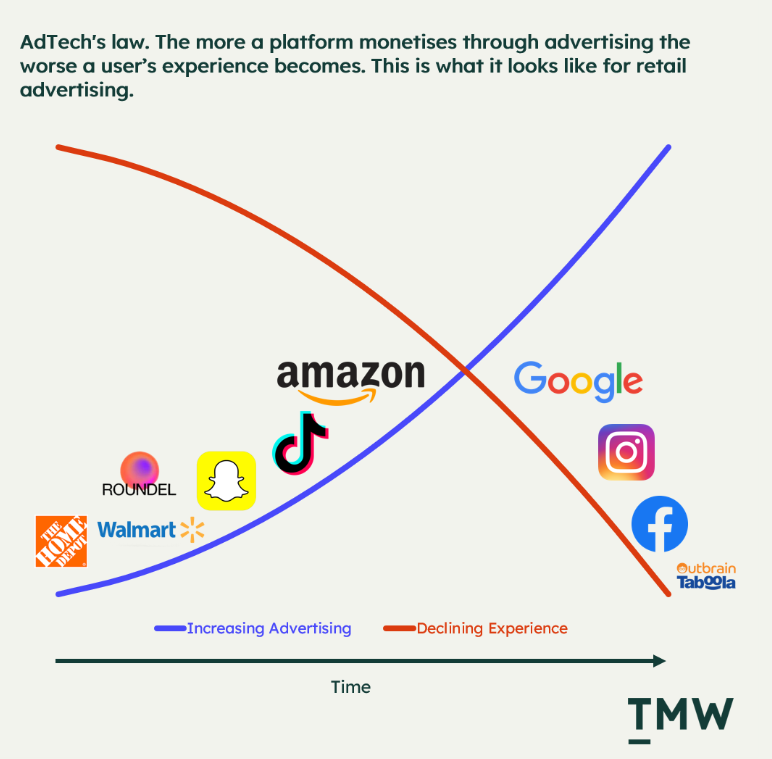
What this creates is two things: Inequality and distrust. And I think that in so much of technology – particularly in business-to-business technology – this is exactly what is playing out. The larger firms have the budgets, resources and staff to completely dominate the mindshare of entire categories. And I’m not arguing against that; it’s a free market, and the reward of building a large company is having a greater say in who buys technologies in their categories – it’s the basic power laws of free market capitalism.
And we’re starting to see this with a variety of tech companies that have reached critical mass. Salesforce has defined the CRM category by leading the market share of this category for more than a decade. The same applies to how Amazon defines online e-commerce, Meta defines social media, and Google has defined search: market power is more than just capital – it’s influence.
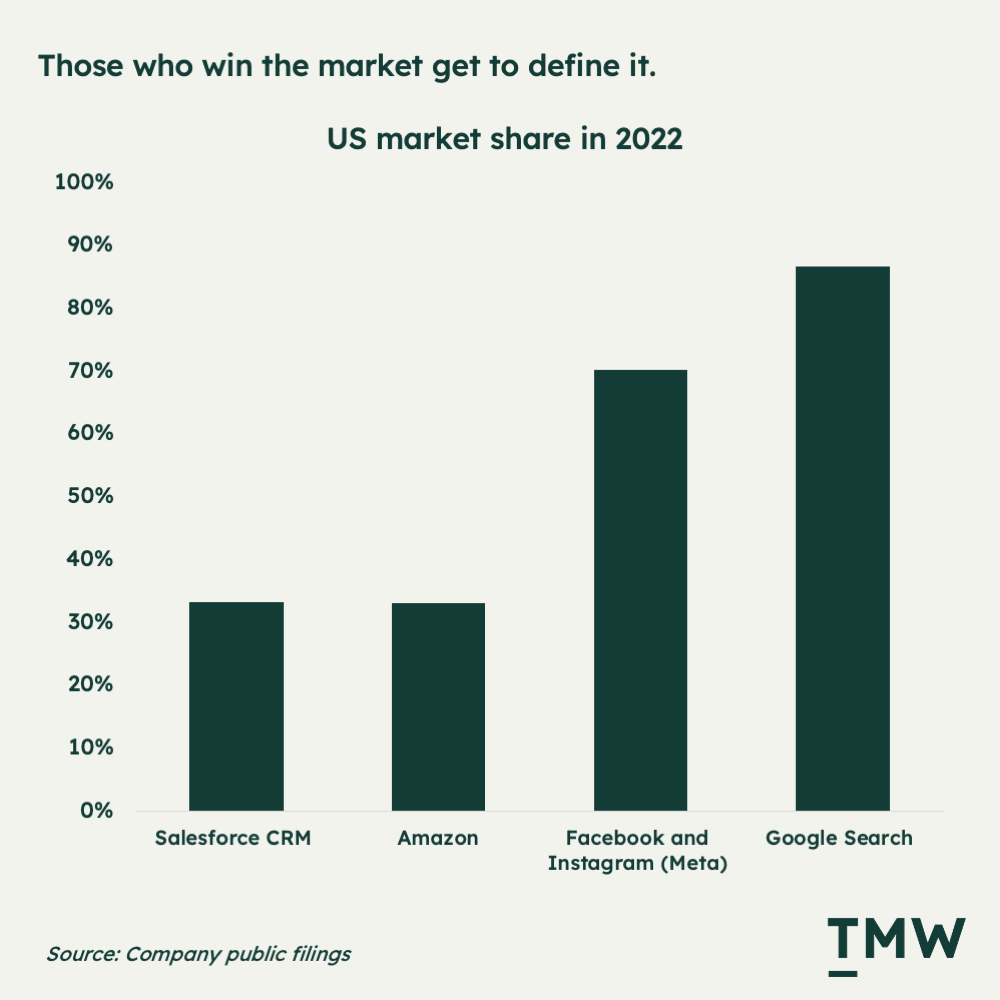
But this becomes a huge problem as things degrade. Large research firms produce vendor ranking reports that are written by internal analysts, which is an opaque process. How exactly do these companies appear on the radar of these analysts in the first place? I'm sure there's some wining and dining happening in the midst of all that number crunching. That’s why when you see a new Gartner Magic Quadrant or a Forrester Wave, you rarely see the dozens or hundreds of startups and smaller companies in those categories. Instead, what’s usually represented are the large enterprise players. Ask yourself a simple question by looking at the below Gartner Magic Quadrant: Who are the winners in this chart?
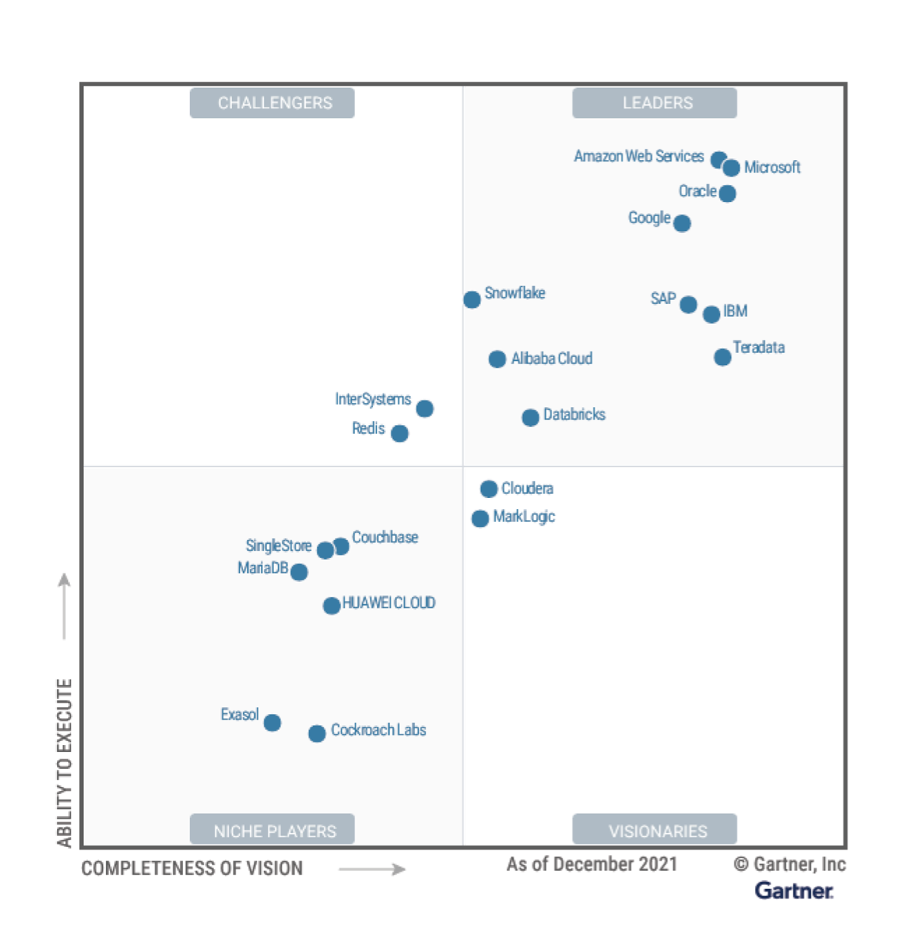
The answer is everyone. It doesn’t matter if your company is a visionary, or a leader, or a challenger – all of these categories are feel-good titles. Over time, this quadrant-style assessment of marketing technologies resembles more of a Myers-Briggs personality test than an assessment of the actual innovation, excellence, success, or growth of these companies.
And when we’re wanting to find marketing technologies in our research, we might turn to G2, Capterra, or TrustRadius. But again, these marketplaces fall short of providing the kinds of information buyers need. The data shown with ranked companies is based on customer testimonials and company size, not innovation or breakthrough ideas. Even then, there’s no comparison of total customers and those that leave a review. And I constantly get paid ads asking me to leave a review on these platforms for a $25 Amazon gift card. Not all is what it seems.
When it comes to buying Martech, I think most people would agree that it’s a low-trust environment. From my estimate, about 43% of companies in the main categories of Martech have a 4 or 5-star rating on G2, almost none 3 and below, and a lot of companies have 0-star ratings. It’s like that old Google Search joke: when you’re searching for a disease, what you’re going to see are the diseases that have the best SEO.
The same applies to software marketplaces – the first results with the best ratings are the ones that are just better at their content marketing. The problem here is that it’s an inaccurate way to gather insights on the breakout innovators in Martech. If you’re innovating in CRM, you’d have to spend years to get anywhere near the front page of G2 for that category. Forget about it.
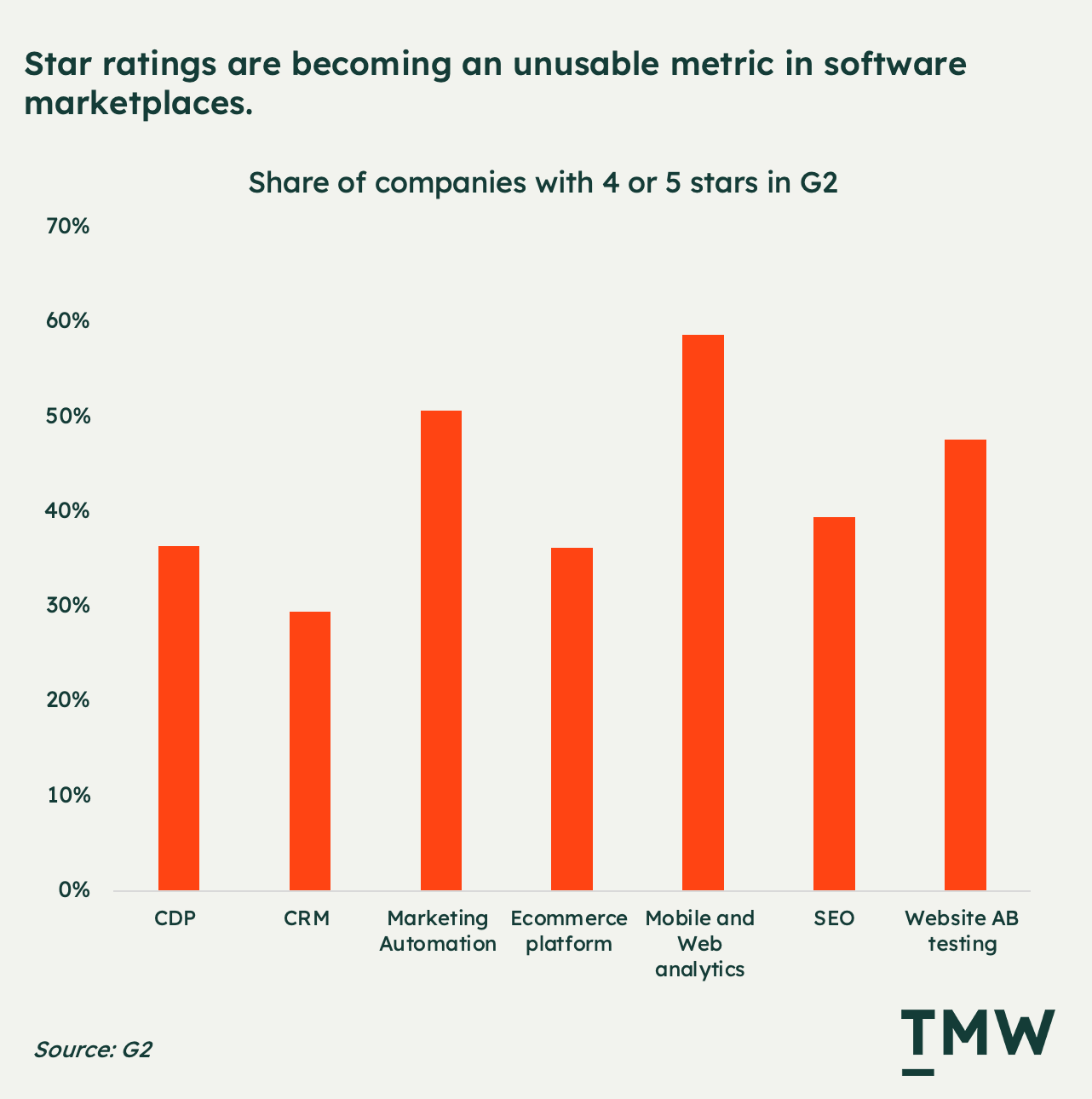
If we extend this to the awards industry itself in marketing and advertising, Kevin Lynch does an interesting review of how degraded mainstream marketing and advertising awards have become. Some of his stats here are absurd, to say the least. For example, Cannes Lions, one of the ad industry’s most prestigious awards events, have 628 different categories that need a full 5 days just to run the ceremonies; D&AD recognized over a thousand ads last year in their awards event; One Show has a total of 366 judges; and Clio awarded 1,135 award winners last year.
This is not to mention the Forbes 30 under 30 awards that hilariously had outright fraudsters win a place, and a constant stream of publications willing to place people in top innovator lists if they paid a fee. Increasingly, if you want to find out who the successful grifters are, the Forbes 30 under 30 is a good place to start.
So if we really want to recognize and reward excellence in the tech and marketing fields, there are very few outlets that do that. But there’s no shortage of publications, research firms, and marketplaces that are more than happy to take your money to ensure you a winning place in their awards event or vendor rankings report.

The problem is vast and broad across the industry, and it’s breaking buyer and consumer trust. Media and awards programs are calibrated to obfuscate and confuse. And much in the same way that TMW is an antipattern to traditional online media by saving subscribers time, not taking ads, and offering industry-neutral viewpoints, we’re now moving into an equally adversarial marketplace of ideas – the awards space – by asking companies that claim to be innovative and disruptive to prove it.
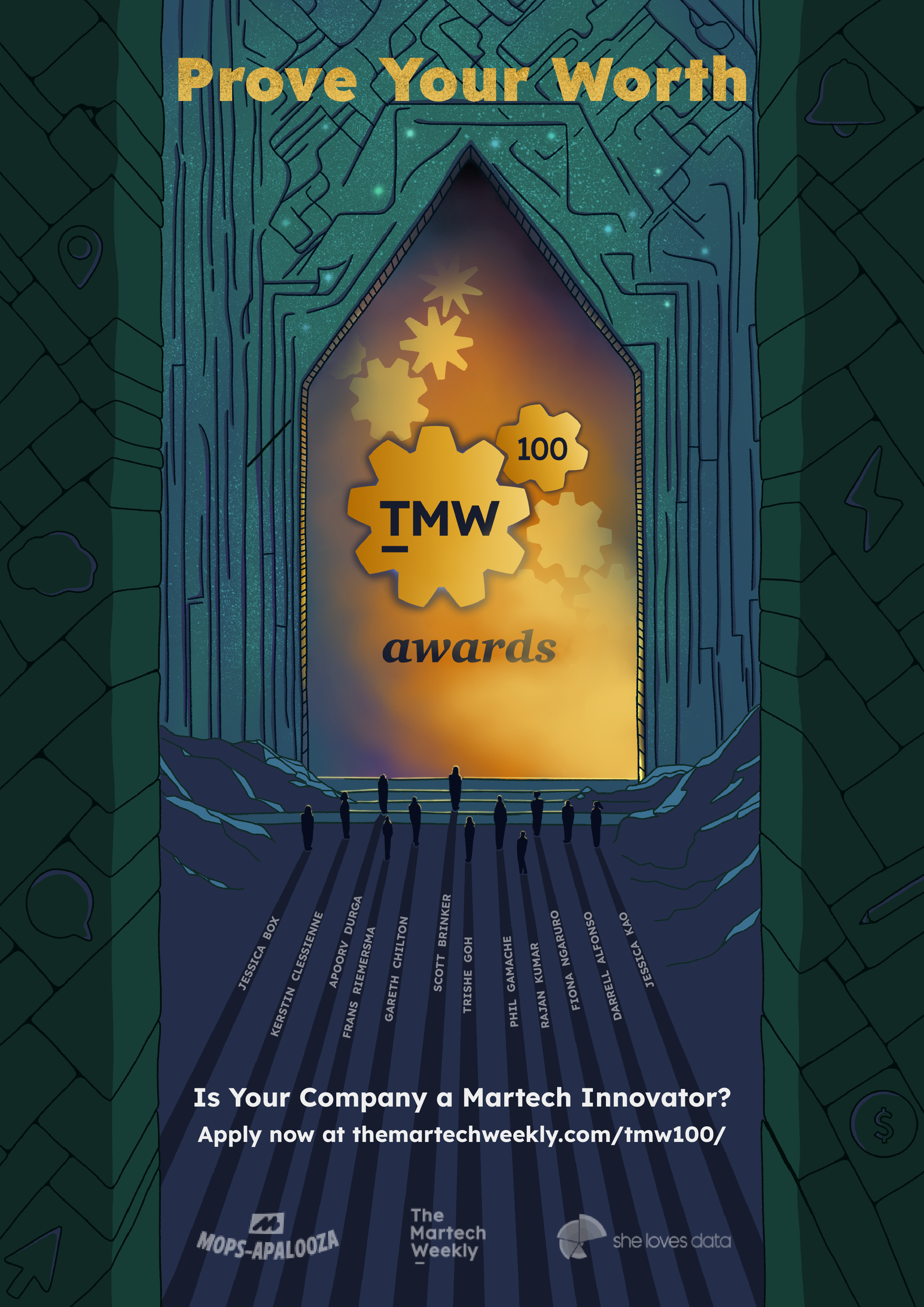
A Pulitzer for Martech
So far, I’ve talked about how, in general, there’s a lack of integrity in most of the ways we rank and recognize different technologies. Now I want to talk about the features of competitions and awards programs that are high integrity and are massively successful. And there’s plenty to look at if you peer out of the marketing-advertising cubicle.
The Olympics is one of them. One of our oldest competitions on Earth, the Olympics started more than 2,700 years ago in ancient Greece and took more than a thousand years to turn into the modern format we have today. What started as a religious festival in honor of the Greek god Zeus, turned into a full-blown athletic showdown. Like TMW 100, the Olympics only had one category and one award – a 600-foot race – and stayed like that for more than 50 years, until it evolved into a sprawling list of more than 40 sports, including skateboarding and surfing today.
The Olympics represent the pinnacle of athletic achievement. It has inspired countless generations to train to become the best in the world. It’s also created a status game for the countries that host the Olympics – it’s a signal that a country can deliver a large-scale international event and enjoy the rewards of increased tourism and investment. That’s why countries spend upwards of $50 billion just to host the games. The reason why the Olympics is so successful is that the athletes have to earn it, and that requires heroic levels of patience, discipline, skill, and talent to achieve.
Another good example is the Pulitzer and Nobel Peace Prizes: Literary and Diplomacy awards that exist to recognize the people who are making outsized contributions in their field. It’s a competence marker. Both are highest-status awards events for our intellectual and social life that separate regular people from the legends.
Instead of taking a leaf out of the advertising industry, I’m inspired by these examples. The early focus of the Olympics, the rigor of the Pulitzer, and the importance of the Nobel Peace Prize are all inputs to how I’ve intentionally designed the TMW 100 awards.
For example, we get a filtering function and a feedback function by doing a two-step awards event. Judges decide who gets in, and the marketing public gets to choose their winners. We’ve also introduced a fairness framework that multiplies votes for smaller companies so that larger enterprise tech companies don’t skew the votes due to their larger base of employees. And TMW 100 is not designed to host a gala event. There's a reason for that. Partnering with MarketingOps means that the winners won’t be celebrated by a room full of peers but by active buyers and implementers of marketing technology – the people that matter most to any tech company serving marketers.
An example that does well in the tech space is Product Hunt, that do daily public voting for new startups. With the right kind of companies that have genuinely interesting technologies and the right community backing, winning a daily list in Product Hunt can instantly accelerate the distribution and awareness of new companies. Product Hunt also does an annual awards event called the “Golden Kitty”, which establishes the product of the year and the winners by category. Winning the product of the year is a big deal because the public decides it, and to do that, you have to earn it.
The insight here is that people have always done these kinds of awards events stretching back for thousands of years – it’s part of the very fabric of society. If thousands of years of history involving large-scale competitions and awards events across almost every conceivable category of human thought and ability can teach us anything, it’s this: Reputation matters. I genuinely believe that those with the best reputations earn it – they don’t pay for it – and are the ones to create category-defining, long-lasting, and valuable companies. You can buy attention with ads, but you can only earn reputation.
But for new categories like technology for marketers and tech in general, these categories are too young to have an official recognition program. This is what we’re trying to change with the TMW 100: a real way to genuinely reward and recognize excellence in the marketing technology industry from both the leading experts and the public. Less Cannes Lions. More Pulitzer.
My hope is that we find some incredibly game-changing and novel technologies out there among the 11,038 identified globally and that they get the recognition and awareness they deserve. I hope that you join me as we launch TMW 100.
Will you be joining us?
As it’s the first of its kind, TMW 100 is a total experiment. That’s why we need you to get involved. You can share our launch poster with your network, or reach out by replying to this email if you’d like to consider being a judge or charity partner for 2024. And if you work for an innovative technology company serving marketers, you can learn more and apply here.
We’d love for you to support the event in any way you think would be helpful. This is about recognizing the technology leaders in marketing, no matter their size, location, gender, ethnicity, or size of marketing budget. It’s about restoring trust in the marketing technology industry and clarifying the companies that matter in Martech.
Stay Curious,
Make sense of marketing technology.
Sign up now to get TMW delivered to your inbox every Sunday evening plus an invite to the slack community.
Want to share something interesting or be featured in The Martech Weekly? Drop me a line at juan@themartechweekly.com.
